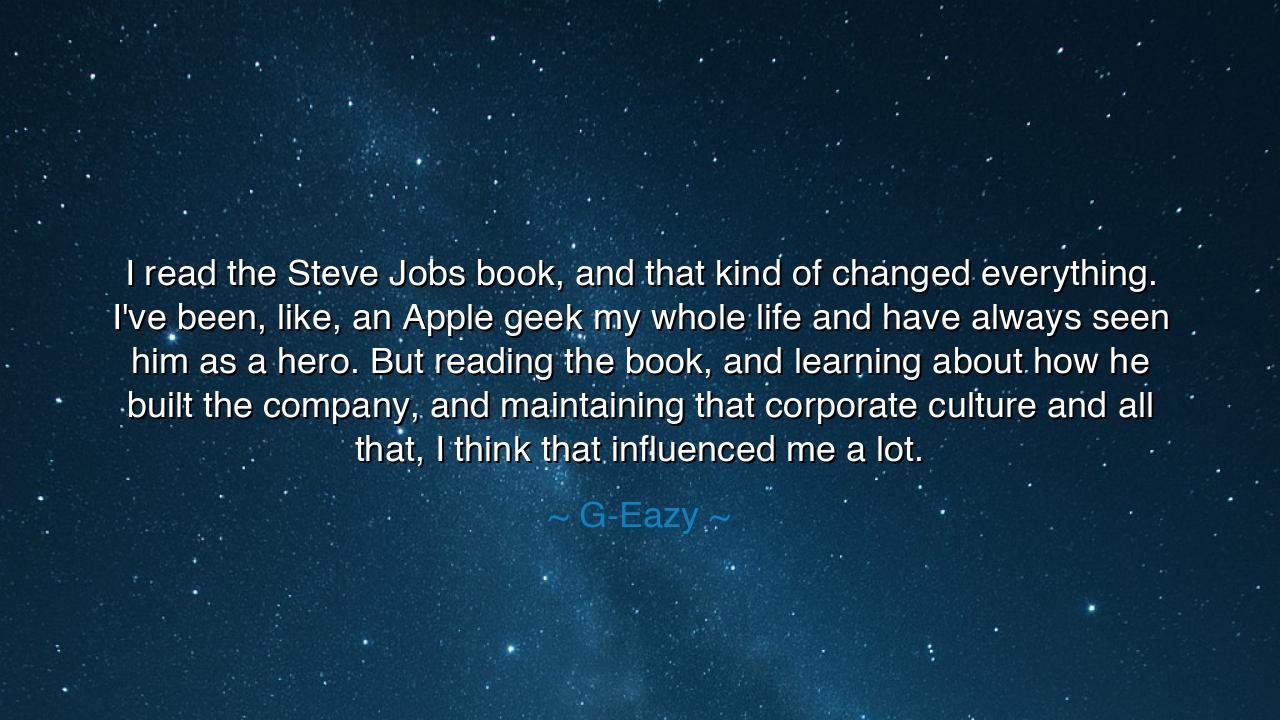
I read the Steve Jobs book, and that kind of changed everything.
I read the Steve Jobs book, and that kind of changed everything. I've been, like, an Apple geek my whole life and have always seen him as a hero. But reading the book, and learning about how he built the company, and maintaining that corporate culture and all that, I think that influenced me a lot.






The words of G-Eazy reveal a truth as ancient as the craft of mastery itself: that one book, one story of a great life, can awaken the fire of purpose in the soul of another. When he says, “I read the Steve Jobs book, and that kind of changed everything,” he speaks of a moment of transformation, when admiration became aspiration, and the dreamer was reborn into a builder. To read of another’s struggle, their discipline, their pursuit of beauty through chaos, is to glimpse the divine spark that drives all creation. G-Eazy’s confession is not merely about technology or music—it is about how vision begets vision, and how the legacy of one man’s relentless spirit can ripple through the ages to shape the next generation of creators.
In the story of Steve Jobs, there lies an ancient pattern: the visionary who unites art and science, imagination and order. Like Daedalus crafting wings for his son Icarus, Jobs built machines that allowed humanity to soar into the digital heavens. Yet he demanded purity of design, simplicity of function, and harmony of soul within the tools he made. When G-Eazy read of this, he did not merely read of a man building a company; he saw a philosopher forging culture, a modern Prometheus shaping light from silicon and code. That realization—of discipline married with creativity—transformed him, for he saw that greatness is not born in chaos, but carved through vision and control.
There is a moment in every creator’s journey when admiration must turn into emulation. To see one’s hero as human—flawed, driven, and fiercely committed—is to learn the sacred truth that greatness is not magic, but method. Jobs was known for his fierce protection of Apple’s corporate culture, an ecosystem where innovation was not a byproduct but a creed. G-Eazy, a craftsman of sound rather than circuit, saw in that culture a mirror of what artistry demands: focus, clarity, and the refusal to compromise with mediocrity. Thus, the lesson that “changed everything” was not about devices or design—it was about building a world around one’s ideals.
In ancient times, the philosopher-kings of Greece or the guild masters of the Renaissance guarded their schools of craft as sacred ground. Each apprentice who entered their halls was not merely learning technique, but joining a lineage of thought. So too did Jobs protect his temple of creativity, ensuring that Apple’s soul remained untouched by the corrosion of complacency. When G-Eazy speaks of maintaining that culture, he echoes this timeless truth: that to sustain greatness, one must defend the purity of purpose against the decay of comfort. Creation demands guardianship as much as inspiration.
Consider also the journey of Leonardo da Vinci, whose notebooks reveal a mind forever balancing invention and beauty. He, too, sought perfection through relentless iteration, sketching wings, gears, and faces in pursuit of harmony between man and machine. In every age, the greatest innovators—whether painters or programmers, composers or CEOs—share this same sacred restlessness. When G-Eazy encountered Jobs’ life, he found kinship in this eternal discipline, understanding that to create something enduring, one must labor not only with talent, but with obsession, vision, and unwavering values.
From this story emerges a moral worthy of remembrance: heroes are not meant to be worshipped, but to ignite the hero within us. The act of reading, when done with an open soul, is a kind of initiation—a passing of the torch from one generation of makers to the next. G-Eazy’s transformation mirrors that of countless seekers who, upon hearing the tale of a master, vow to craft their own legend. Thus, every reader must ask: what will I build after witnessing the labor of the greats? What culture, what art, what song or system will I defend as sacred?
Let the lesson be this: greatness is not an accident of birth, but the deliberate weaving of vision, values, and persistence. Read deeply. Observe the architects of your age. Study not their triumphs alone, but their methods, their principles, their culture. Then, as G-Eazy did, turn admiration into action—forge your own path with the same devotion. For in the end, it is not enough to love a hero; one must become one, and in doing so, ensure that the light of inspiration never fades from the world.






AAdministratorAdministrator
Welcome, honored guests. Please leave a comment, we will respond soon